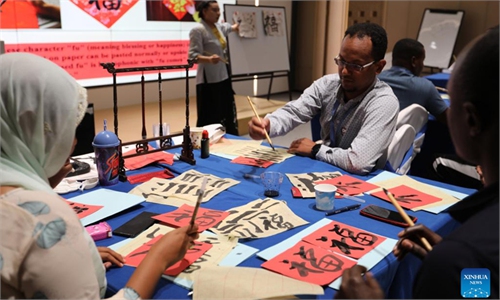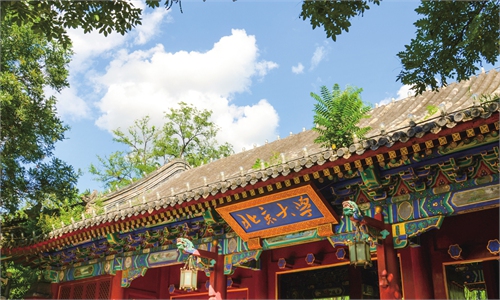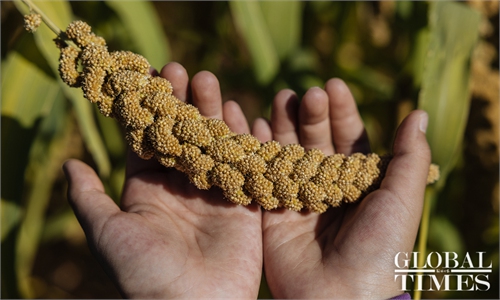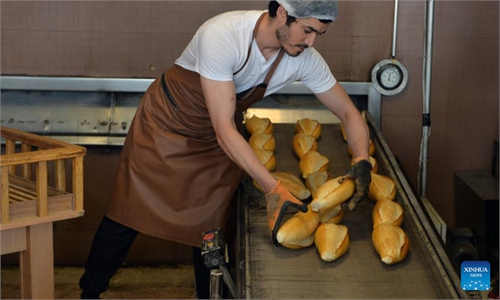ARTS / CULTURE & LEISURE
Rich Chinese culture wows fans in Rwanda
Culturally connected
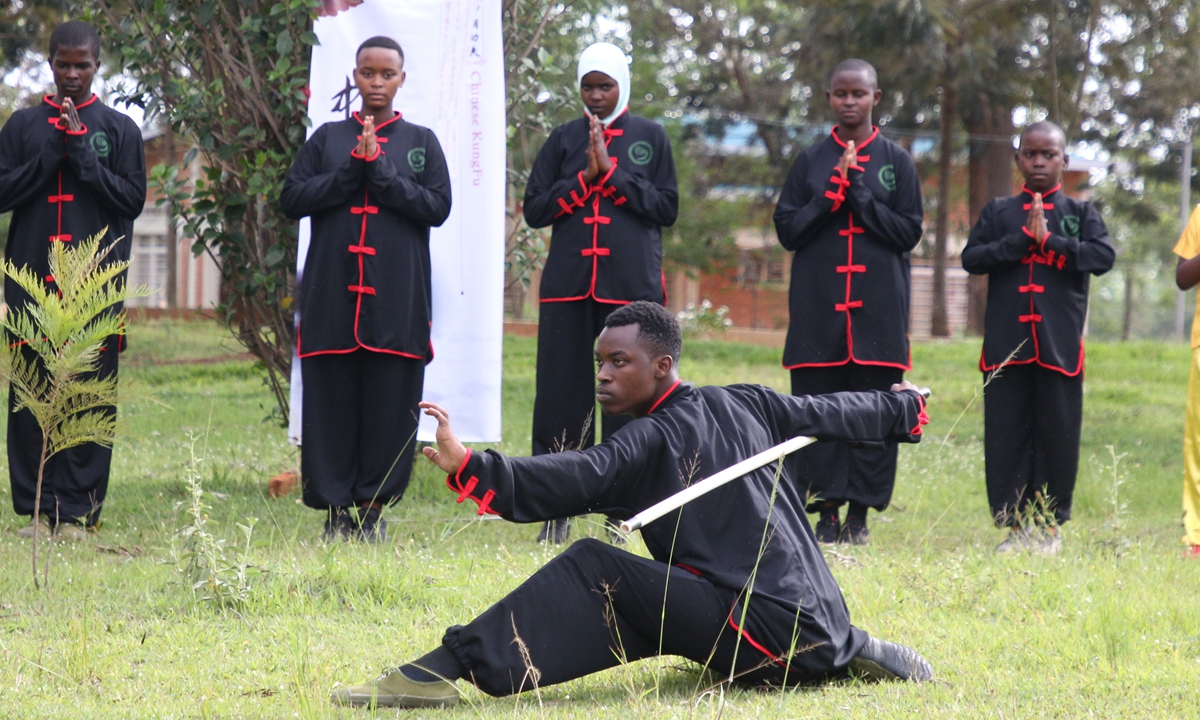
Students perform Chinese martial arts at the University of Rwanda on November 10, 2021. Photo: Xinhua
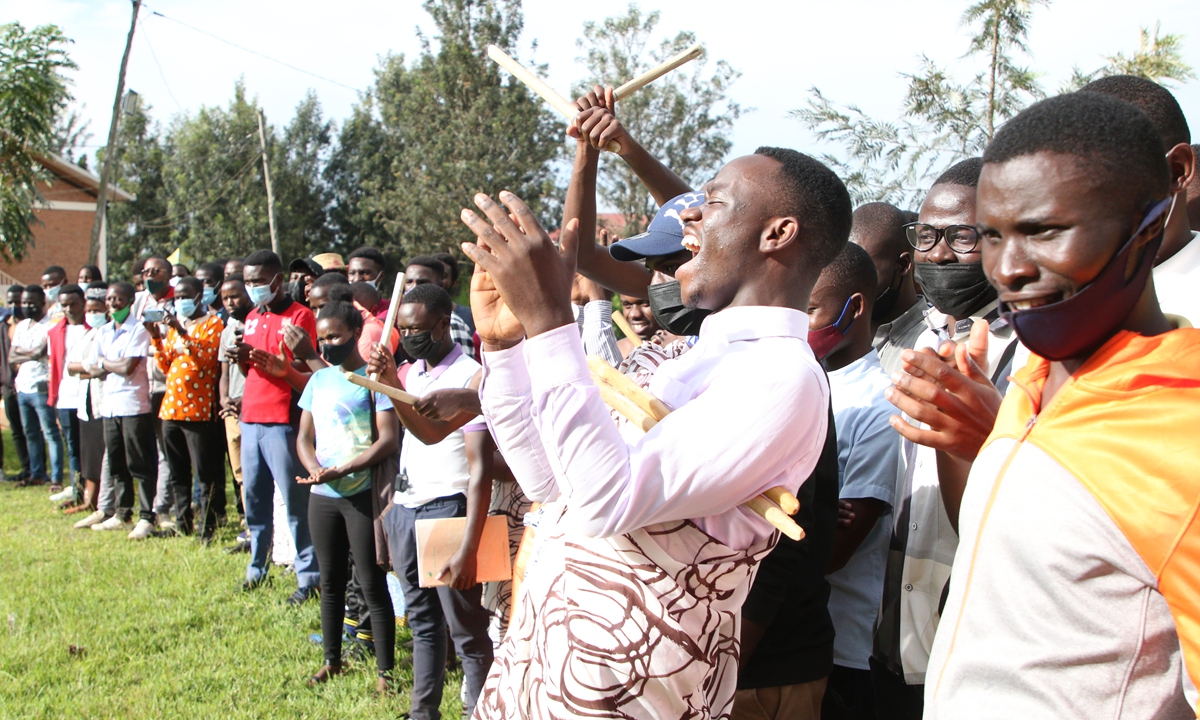
People enjoy watching the Chinese martial arts performance at the University of Rwanda on November 10, 2021. Photo: Xinhua
A crowd made up mainly of young people braved the scorching sun in the Rwandan capital of Kigali Friday visiting Chinese cultural exhibitions on display at the University of Rwanda, featuring items ranging from Chinese literature, calligraphy, dance music, traditional costume, cuisine to Chinese kung fu.The afternoon began with a rousing display of kung fu or martial arts, which rapidly became a crowd pleaser at the cultural exhibition. The participants, both boys and girls, amazed the crowd with energetic and tactical maneuvers.
Some visitors stood while others sat on the lawn, waving and applauding the participants in the show organized by the Confucius Institute at the University of Rwanda's College of Education, Remera campus.
A few meters away, a crowd gathered around the Chinese traditional costumes on display, which have also been one of the most popular attractions at the exhibition.
Visitors included university students, people from the community as well as secondary students from selected schools around the city.
Didacienne Mugwaneza, a third-year food science and technology student at the University of Rwanda's College of Agriculture and Veterinary Medicine, said Chinese costumes were "particularly beautiful" while Marie Reine Nyinawabera, a crop science student, said she was impressed by the martial arts display.
'Happy and excited'
As visitors walked from one booth to another, they could ask booth managers questions about the Chinese cultural representation or try their own hands at the activities.
The Institute invited selected students taking Chinese language lessons to join them in explaining to visitors the Chinese culture. At one of the booths, Chinese drawing using special paper was become a popular attraction.
As an added bonus, visitors were also able to leave with gifts after participating in different challenges.
Several challenge activities were set up for participants, including reciting a blessing, singing a Chinese song, writing calligraphy, Chinese boxing, paper cutting, Chinese handicrafts, and making a pot of tea.
"I'm honored to tell fellow students and the community about Chinese culture," Desire Rukundo Gakuru, one of the participating students, told Xinhua. "We are very happy and excited when many people come to get to know more about Chinese culture."
Gakuru, 26, participated in the paper drawing display.
It was the first time that he had attended this type of exhibition but thoroughly enjoyed it. The public health student started taking Chinese language lessons in 2018 but it was interrupted by the COVID-19 pandemic.
Gakuru particularly enjoys Chinese tea and art. He hopes he will be able to take on a translation job once he learns Chinese but also it could give him an edge when seeking an education scholarship to China.
Ketia Muhizi, a female Grade 7 pupil from Green Hills Academy, admitted that at first, she didn't know much about Chinese culture. "The exhibition was insightful as we learned much about Chinese culture, it is amazing! You can appreciate its influence around the world," she said.
Close to each other
"Chinese culture is a treasure trove that is very worth exploring and today's event is a good chance for us all," said the Chinese Ambassador to Rwanda Wang Xuekun at the event. "As long as two peoples enjoy a strong affinity, the future China-Rwanda relations are sure to develop," he said.
Wang hailed Rwanda as an open and dynamic society ready to explore a foreign culture.
Citing patriotism and unity in diversity, the ambassador noted that Chinese and Rwandan cultures are close to each other.
"Patriotism is an important feature of Chinese culture. Chinese people love their country and are proud of their culture. Building a strong nation, achieving prosperity and making people live a better life has always been the top consensus among Chinese people. On this level, we are the same and we understand you," he said, adding that each Rwandan he knows also has a deep passion for their country and its culture.
Zeng Guangyu, director of the Confucius Institute at the University of Rwanda, said language and culture sometimes move together.
"We invited the community around to participate so that they can see and touch and feel the experiences. Secondary school students for example taking Chinese language lessons learn it from textbooks but the exhibition gives them the opportunity to see the culture," he said.
